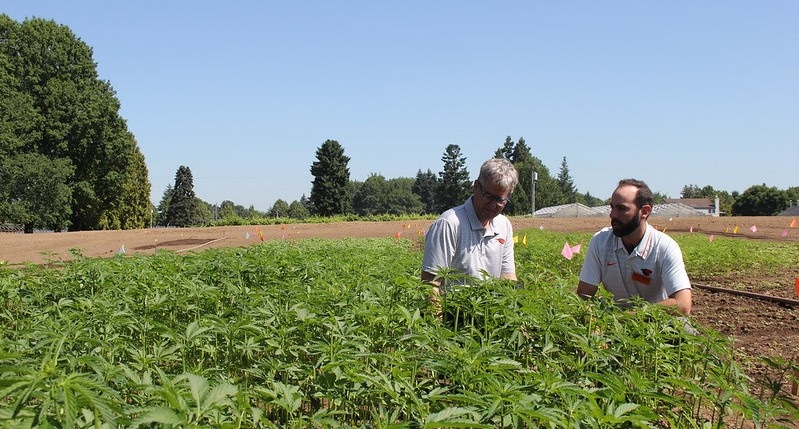October 15, 2021

Oregon State University’s Global Hemp Innovation Center and three other Western universities have been awarded a $10 million grant from the U.S. Department of Agriculture to define economic opportunities for hemp in the western United States.
The five-year project is funded by the USDA National Institute of Food and Agriculture’s Sustainable Agricultural Systems grant program. Oregon State scientists are partnering with eight institutions across the nation on this research, which addresses the needs of Native American and other rural community businesses and farmers in a four-state Western Pacific region.
“We established the Global Hemp Innovation Center in 2019 to bring together a wide variety of stakeholders to address big unanswered questions about the hemp industry,” said Jeffrey Steiner, associate director of the center. “While enthusiasm for hemp has grown, there is still a tremendous lack of knowledge about the crop.”
Additional partners on the project include the University of California, Davis; Washington State University; University of Nevada, Reno Extension; USDA, Agricultural Research Service; United States Department of Transportation, Volpe National Transportation Systems Research Center, the Federally Recognized Tribes Extension Program; 7 Generations, a Native American-owned firm that specializes in Indian Country business development; USDA, National Agricultural Library; and the USDA, Western Rural Development Center.
The recent decriminalization of hemp with the passage of the 2018 farm bill created a boom of interest in the potential of hemp. Establishing a successful hemp industry requires more research on where different hemp grain, fiber, and essential oil market classes should be optimally grown and the best genetics to use; how to incorporate hemp into existing production systems to complement rather than disrupt markets; where to process the grown materials that are used to manufacture hemp products; and what are the likely growth markets to support industry expansion.
The research team will address these questions by targeting the rural transportation corridor that traverses Washington, Oregon, Nevada and California east of the Cascade-Sierra Nevada Mountains from Canada to Mexico. The region represents diverse, generally arid environmental conditions and encompasses both large areas of irrigated and non-irrigated production.
Because Native American Tribes are significantly represented across the four-state region, the researchers are incorporating Native American farmers and other tribal leaders, including from the Confederated Tribes of Warm Springs in Oregon, in the effort, with a goal to include their cultural and economic needs as part of business development efforts.
Tribe explores production
“The Warm Springs Tribe has interest in exploring and expanding our agricultural opportunities in hemp production and this is one avenue to achieve this,” said Laurie Danzuka, Warm Springs cannabis project coordinator. “This collaboration will allow us to identify potential sustainable uses for hemp, utilize best farming practices and provide learning opportunities to the membership.”
The engagement of tribal communities also aims to address historic inequities in agriculture and will engage Native American students in different aspects of the emerging hemp sector, Steiner said.
“The up-front involvement of tribal communities along with other rural communities in this work is critical to its success,” Steiner said. “The potential economic opportunities this new commodity may have presents tremendous potential for rural communities and our project has set out to ensure those opportunities are equally available and relevant to all kinds of farmers.”
In addition to Global Hemp Innovation Center scientists from Oregon State’s College of Agricultural Sciences, the project also includes researchers from OSU’s colleges of Business, Engineering and Pharmacy, and the Extension Service.
Source: Oregon State University, which is solely responsible for the information provided and is wholly owned by the source. Informa Business Media and all its subsidiaries are not responsible for any of the content contained in this information asset.
About the Author(s)
You May Also Like




